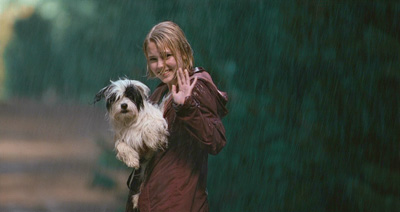BRIDGE TO TERABITHIA
**½/**** Image A Sound A- Extras C
starring Josh Hutcherson, Annasophia Robb, Robert Patrick, Zooey Deschanel
screenplay by Jeff Stockwell and David Paterson, based on the book by Katherine Paterson
directed by Gabor Csupo
THE SEEKER: THE DARK IS RISING
½*/**** N/A
starring Alexander Ludwig, Christopher Eccleston, Ian McShane, Frances Conroy
screenplay by John Hodge, based on the book by Susan Cooper
directed by David L. Cunningham
THE SPIDERWICK CHRONICLES
**/**** Image A Sound A Extras C-
starring Freddie Highmore, Mary-Louise Parker, Nick Nolte, David Strathairn
screenplay by Karey Kirkpatrick and John Sayles, based on the books by Tony DiTerlizzi and Holly Black
directed by Mark Waters

by Walter Chaw In the genre of wide-eyed, hyperactive ‘tween bullshit, there seems a common thread of missing parents or siblings with all the attendant Oedipal complexities upon which to coat-hanger every genus of just-pubescent, Uncle Joe Campbell shenanigans. (Oh, I get it, it’s a metaphor for strange hair, jerking-off, and embarrassing hard-ons–no wonder I identify with these things again as I get older.) More underground than overt adolescent emo rock-star/rapist fantasies like vampirism, the flicks of this type that work–such as Sam Raimi’s Spider-Man trilogy, or the third and fifth Harry Potters, or The Passion of the Christ–incorporate the uncertainty and body horror of growing up with hero/martyr fantasies and, ultimately, the melancholy of childhood’s end. The result of a job well done is a piece of enduring, often befuddling, resonance, owing in part to the canny hijacking of some existing folklore or mythology (including comic books) and the gratifying recognition that at the end of all that hormonal devastation is the justification of manhood. Psychosexual psychodrama at least, the new crop of boy-into-man-boy flicks, in the wake of the astounding success of that certain boy wizard (and, shit, probably Shrek‘s, too), takes a new interest in fantasy as a means to specific ontological ends. For this unabashed fan of Matthew Robbins’s idyllic, laden Dragonslayer, it’s not entirely bad news.

![A Bug’s Life (1998) – [2-Disc Collector’s Edition] DVD + Blu-ray Disc](https://i0.wp.com/filmfreakcentral.net/wp-content/uploads/2009/05/bugslife.jpg?fit=1024%2C435&ssl=1)
 by Walter Chaw
by Walter Chaw![High School Musical (2007) [Remix] – Blu-ray + DVD; High School Musical 2 (2008) [Extended Edition] – Blu-ray Disc; High School Musical 3: Senior Year (2009) [Deluxe Extended Edition] – Blu-ray + DVD + Digital Copy](https://i0.wp.com/filmfreakcentral.net/wp-content/uploads/2009/02/highschoolmusical3.webp?fit=1024%2C555&ssl=1)
 by Walter Chaw
by Walter Chaw by Walter Chaw
by Walter Chaw